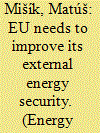| Srl | Item |
| 1 |
ID:
185707


|
|
|
|
|
| Summary/Abstract |
The spike in energy prices and feared natural gas supplies shortage during the winter of 2021/2022 indicate a limited ability of existing energy measures to deliver energy security for the European Union. Moreover, the lack of a common external energy security policy made it difficult for the EU to assume a common energy position towards Russiaʼs invasion of Ukraine in February 2022. While the pace of decarbonisation needs to increase for the EU to achieve its 2050 goals, the Union must support its member states’ energy security (including its external dimension) during the transition period, until it will be provided by domestic low-carbon energy sources.
|
|
|
|
|
|
|
|
|
|
|
|
|
|
|
|
| 2 |
ID:
190603


|
|
|
|
|
| Summary/Abstract |
The key policy priority for governments around the world during the 2020–2021 period was the response to the Covid-19 pandemic. However, this was swiftly replaced by an even graver urgent need to respond to Russia's full-scale attack on Ukraine in February 2022. This special issue aims to study the post-pandemic response and how related policy choices influence decarbonisation and energy transition efforts in the EU. While the special issue was initially conceived before Russia's invasion of Ukraine, the question of policy responses to critical situations remains even more relevant in the face of Russia's attempt to redraft the political landscape of Europe by force. The dichotomy of existing views on whether the crisis caused by the pandemic is an opportunity or a threat to the energy transition is also present in the discussion and perception of the EU's energy and climate policy after the Russian invasion at least temporarily shifted energy security and decarbonisation priorities. Analysing energy and climate dimensions of the EUʼs post-pandemic recovery can provide policy implications applicable to the energy security crisis connected to the Russian invasion of Ukraine.
|
|
|
|
|
|
|
|
|
|
|
|
|
|
|
|
| 3 |
ID:
181058


|
|
|
|
|
| Summary/Abstract |
Renewable sources of energy are considered to play a crucial role in the transition towards a decarbonised economy. Central and Eastern European (CEE) countries’ positions vis-à-vis the European Union’s (EU) renewables goals do not form a homogenous group and have changed over time. After joining the Union, these countries initially supported the EU’s renewables targets due to post-accession compliance; however, once this accession legacy faded away, they started to pursue their preferences in a more assertive way, which resulted in different strategies and priorities. The development of CEE countries’ positions towards renewables targets is thus connected to the ‘emancipation’ of these countries and a more assertive way of pursuing their preferences at the EU level, once they were ‘freed’ from the influence of post-accession conditionality.
|
|
|
|
|
|
|
|
|
|
|
|
|
|
|
|